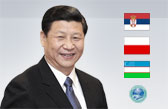UN climate talks seen falling short despite fears
(Agencies) Updated: 2012-11-26 10:48Kyoto extension
To keep up climate action, most countries favour extending the 1997 Kyoto pact, which binds developed nations to cut greenhouse gas emissions by an average 5.2 percent below 1990 levels between the years 2008 and 2012.
But Russia, Japan and Canada have pulled out in recent years, meaning that Kyoto backers are down to a core led by the European Union and Australia that account for about 14 percent of world emissions.
Developing countries and Kyoto backers say it is vital that developed nations lead the way towards the new worldwide accord meant to be negotiated by the end of 2015 and to start up in 2020.
Failure to extend Kyoto would leave only national actions, with no legally binding UN framework. "The Kyoto Protocol is going to be very important for us," said Seyni Nafo, spokesman of the African group of nations. "And ambition is very low."
The EU and others agreed at last year's talks in Durban to extend Kyoto for a new period but details remain to be agreed, such as whether it should last five or eight years.
The EU said it would not deepen its own goal at Doha, of a 20 percent cut in emissions below 1990 levels by 2020, to an alternative of a 30 percent cut if other rich nations also act.
"We will ... keep the door open to go further, to 30 percent, even if that is not going to happen this year," said EU Artur Runge-Metzger of the EU Commission.
A study by the London-based International Institute for Environment and Development said on Monday that rich nations had fallen short on promises to give poor countries $30 billion in new aid to help them combat climate change from 2010 to 2012.
It said commitments so far totalled just $23.6 billion, and most was in loans that would have to be repaid by the poor.
Another study by international aid agency Oxfam also estimated that only 33 per cent of the "fast-start finance" promised at a Copenhagen summit in 2009 could be considered new.
Rich nations have also promised aid totalling $100 billion a year by 2020, but did not make any clear pledges for 2013-2019.
- Divisions to hamper Doha talks
- Doha heats up for climate change conference
- Obama likely to take on climate change during second term
- China urges turning climate talks into action
- Mutual respect needed on climate issue
- Leading role pledged to fight climate change
- China issues report addressing climate change







